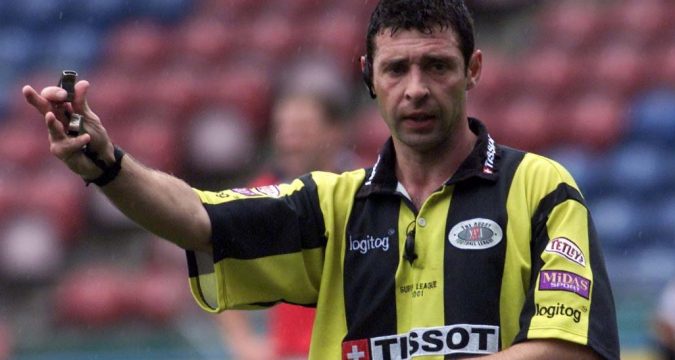
These days, rugby league has every right to be proud of its support and enhancement of the game’s handling of player welfare.
In such a macho, tough sport, barriers have been increasingly broke down in recent years to encourage players who are struggling with their mental health to speak out – as evidenced superbly by this weekend’s dedicated State of Mind round.
But while we channel all our energy into ensuring player welfare is at its best, it’s perhaps easy to forget about the people on the field who suffer more abuse than anyone else: the officials.
Former Super League referee Ian Smith can attest to the struggles match officials go through – and he has revealed to TotalRL about how abuse from the terraces, coupled with the sudden loss of his job with the RFL in 2016, left him in desperate need of help. After a visit to Sporting Chance, State of Mind stepped in – proving they are more than a support chain for just players.
Smith begins: “I worked for the RFL in a full-time and part-time capacity for just short of 20 years. In January 2016, they had a restructuring of their departments and I left the job – all of a sudden, I just felt a little bit lost.
“Not only was it my income stream, it was my love and my passion. I loved being a rugby league referee and I love rugby league: it’s in my DNA. When you’re not in it anymore all of a sudden, not in that goldfish bowl.. I’m not afraid to say that I lost my identity.
“It wasn’t a case of, ‘look at me, I’m Ian Smith, the Super League refreee’ – I just needed to isolate myself. I had no reason to get up in a morning and go to work, and while I eventually got a couple of jobs, they didn’t give me that adrenaline buzz.. and I felt lost.
“That’s when I got some help through Sporting Chance, and they gave me some focus in my life. After that, having spoke to Highto as a friend, he got me in touch with State of Mind, and they asked if I wanted to do some presenting, and it’s rocketed from there.”
It is increasingly common to attend a rugby league match and witness horrendous abuse towards a match official – a problem which the game needs to grab hold of and stamp out as soon as possible.
And Smith has urged supporters – and anyone who abuses officials – to stop and think about what they are doing before they launch foul-mouthed tirades at referees: admitting himself that he struggled to deal with it throughout his career.
“I didn’t deal with the abuse well at all, and I wish I’d have known how to deal with it back then,” he explains.
“I hated the abuse and the negativity; put the name of any current official into social media and you see it’s not just about the job to some people: it’s personal.
“Walking back to your car from the ground, I had to have lots of stewards escorting me back and it did impact on me. Referees make around 25,000 judgements a game, run between 9-11 kilometres, and burn almost 1,700 calories. Your average heart rate is sky-high, and if you miss that forward pass in the 79th minute that leads to the match-winning try, the abuse can be too much to take.
“My parents stopped going at one stage; they didn’t see any of my last eight years as an official live because they couldn’t take seeing and hearing people abuse their son non-stop. It’s just about remembering what you’re saying. Players make mistakes – so referees should be allowed to make them too. It’s acceptable a player will knock-on, but not acceptable that a referee will miss it? There’s a human being behind that uniform who bleeds, cries and has a family to go home to.
“My plea would be: think about what you’re saying before you say it.”
These days, Smith works closely with State of Mind as one of their dedicated ambassadors, conducting presentations and talks in all walks of life – not just rugby league – to encourage men to share their mental health problems.
And having lost the buzz for life as a whole following his exit from rugby league two years ago, Smith is adamant he has now rediscovered his purpose and mojo.
He says: “It’s not just about players transitioning back into everyday life, everyone involved has to make that switch. We’re lucky as referees that we don’t get injured too often and we can have a career going into our 40s – but there’s still a transition.
“I feel like I’m making a difference now and I’ve got my direction. The feedback from people we give our talks to – we know we’re making a difference. It may only be one or two percent of people that get it but it’s those people who make you realise you’re doing something good. We’re trying to advocate that if you break your leg, you’d go to A&E. Life isn’t linear, it’s a rollercoaster; and if you are struggling with your mental health, it’s fine to speak out.”
